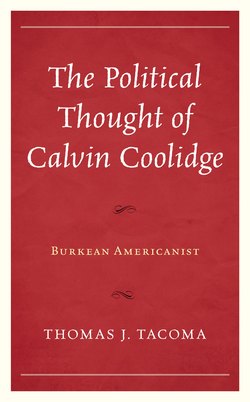Читать книгу The Political Thought of Calvin Coolidge - Thomas J. Tacoma - Страница 4
На сайте Литреса книга снята с продажи.
Introduction
ОглавлениеCoolidge, Progressivism, and American Civilization
A single question prompted this book: how did non-Progressive political thinkers respond to the challenges of Progressivism while at the same time sufficiently addressing the problems that gave rise to Progressive ideas? Studies of the progressive era, which according to most estimates lasted roughly from 1890 to 1920, focus almost exclusively on the Progressives—the challenges they faced, the ideas they embraced, and the reforms they put in place. But if they faced challenges, if they were so strongly opposed, then by whom? And if their ideas won widespread acceptance but ultimately faded from public view by the 1920s, then what was the content of the thought that opposed and replaced those Progressive ideas? More to the point, if Progressive reformers truly sought to transform constitutional government and to usher in a new theory of government to justify their revisions, who stood against them in defense of the older theory, or perhaps to promote an alternative theory, of American constitutionalism?
A few scholars have recently begun to study such questions. Their works focus on “constitutional conservatism” and the opposition to direct democracy found specifically during the Progressive era. While no book-length treatment of the subject has yet been published, several collections treat that specific topic. Johnathan O’Neill and Joseph Postell have taken the lead in this field, coediting Towards an American Conservatism: Constitutional Conservatism during the Progressive Era and publishing other papers on the subject.[1] Lonce Bailey and Jerome Mileur, similarly, have coedited In Defense of the Founders’ Republic: Critics of Direct Democracy in the Progressive Era.[2] These volumes contain numerous insights on the politics and political thought of leading non-Progressive politicians. This book undertakes to extend these lines of analysis, both by broadening them well into the 1920s and deepening them by means of a thorough examination of a particular political thinker.
This book takes up the political thought of Calvin Coolidge. Coolidge won his reputation as “Silent Cal” through the careful cultivation of that image—a crisp, sparse writing style combined with a reputation for saying very little in public or private. If such an image were in fact the true Coolidge, the task of interpreting his political thought would be daunting, if not impossible. Yet Coolidge was not silent. He spoke regularly on public occasions, not least of which were his frequent press conferences during his six years as president of the United States.[3] Three volumes of his collected speeches, published usually in conjunction with or in anticipation of political campaigns (being released in 1919/1920 for the presidential election year, 1924 when Coolidge was at the head of the Republic ticket, and again in 1926 for the midterms), do much to improve the evidentiary base for Coolidge studies.[4] Moreover, his later presidential speeches exist in unpublished form in the Library of Congress.[5] Beyond his speeches, the student of the mind of Calvin Coolidge can consult the collection of Coolidge’s letters to his father; the published collection of his daily column, Calvin Coolidge Says, which ran from 1930 to 1931; and his articles printed for magazines and journals from 1921 through 1934 (the last posthumously published by the Saturday Evening Post).[6] Of course, his autobiography constitutes another obvious point of reference.[7] These writings add up to a considerable volume, testifying not to a silent president, but a president who chose to speak often and according to his own mind.[8]
Beyond the unexamined record of Coolidge’s speeches and writings, he makes a fit figure for understanding constitutional conservatism due to the trajectory of his career. Coolidge’s unique personal and public biography indicate that he was sympathetic to progressive reforms during the early phases of the Progressive Era, but he opposed Roosevelt in the 1912 election and came to oppose and criticize a number of Progressive ideas during his time in national politics. He stood firmly for the U.S. Constitution, articulated a clear view of the development and purpose of the United States, and explained the role the United States should take on the international scene. While he was not the most philosophical of the critics of Progressivism, he was nonetheless a defender of the American regime as he understood it. Consequently, as much as I hope to shed new light on Coolidge, my overarching concern is to understand constitutionalism in the Progressive era, broadly understood.
